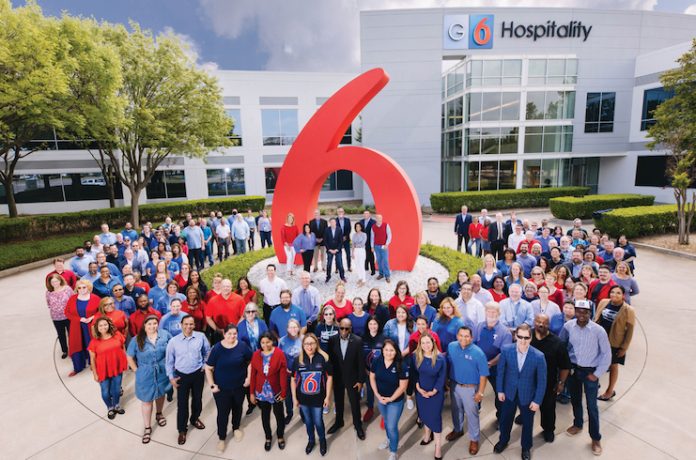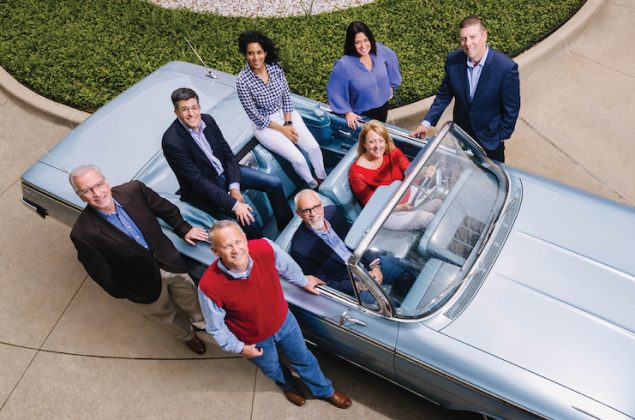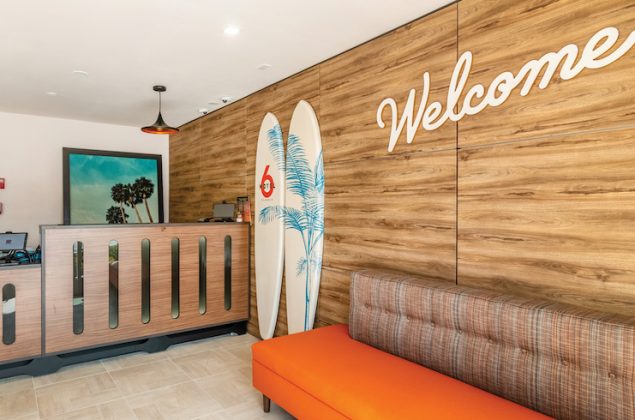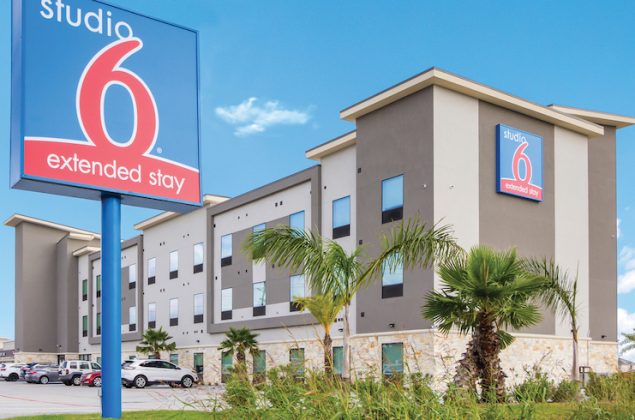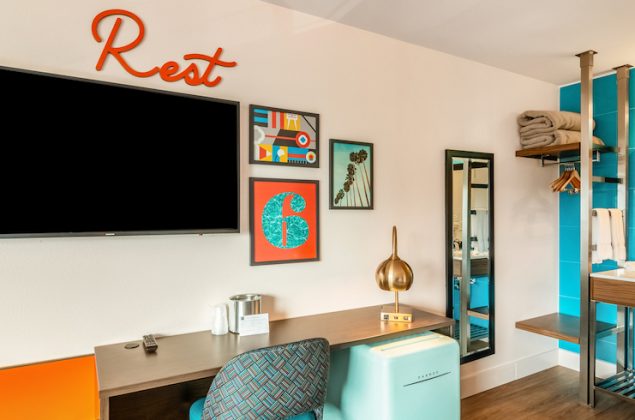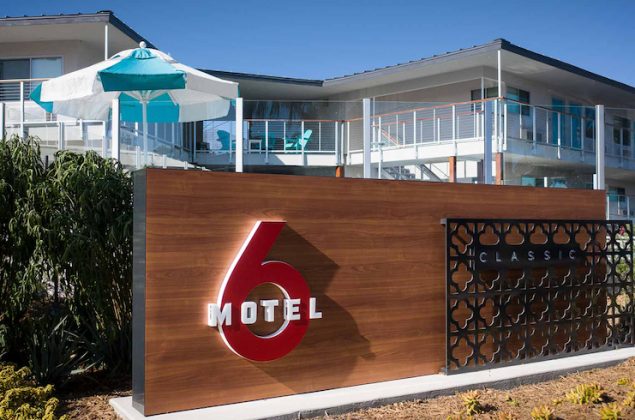In June, G6 Hospitality, parent company of Motel 6 and Studio 6, is celebrating the 60th anniversary of its flagship brand. The first Motel 6 opened in Santa Barbara, California, in 1962 to fill a “simple, unmet need,” explains the company’s CEO Rob Palleschi: “provide consistent, consistently affordable, clean, comfortable lodging.” The company began its journey as owners and operators, evolving over the years to add franchising opportunities. This year, G6 Hospitality is reaching a significant milestone as it transitions to an asset-light, fully franchised model. “Not only is it our 60th, but it’s also a departure from us as owners and operators of assets, which is going to be a transformational change. And I’m excited about it because instead of focusing on three different businesses—the ownership and asset management, the operations, and the branding—we’re able to focus solely on branding and franchising. Our measurement of success will no longer be company EBITDA; our measure of success will be owner satisfaction, guest satisfaction, and growth—the measures that will help us drive this brand forward into the future.”
LODGING spoke with members of G6’s executive leadership team to learn about the company’s direction and their vision for further evolving their brands while remaining true to Motel 6’s original value proposition for owners and guests.
Growth Strategy
Six decades after the first Motel 6 debuted, G6 Hospitality’s brands span more than 1,400 locations in 49 states and five Canadian provinces—and the growth isn’t stopping there. Tina Burnett, chief development officer, says the company has been ambitious in executing its strategic development plan to invest in key markets and ensure guests have affordable lodging options wherever their journey takes them. And while owners supported and complemented that growth strategy over the years, “now they’re the true growth model of the brand.”
Looking ahead, Burnett says the Infrastructure Investment and Jobs Act that President Biden signed in November 2021 is expected to support that growth strategy as well, particularly the development of Studio 6, which launched in 1999 and now totals 160 locations with 50 more in the pipeline. “We’re one of the largest brands in the extended-stay segment that’s franchised. With demand outpacing supply for extended stay, our owners really see the value of that.” To further meet the demand in this space, Burnett says the company launched Studio 6 Suites last year. “We think it’ll really help grow the presence of Studio 6 and give multi-night stay options in conversions, both for guests and our owners,” she explains. “Converting a hotel to an extended stay is very costly with ventilation, plumbing, and all of the electrical requirements. With the Suites model that we’ve come out with, you don’t have to do that; it’s light on the conversion.” For instance, instead of installing a stove that requires ventilation, plugin burners are available to guests at the front-desk. The Studio 6 Suites brand now has 10 open locations and another 15 signed. Burnett says that G6 is focused on expanding its presence in certain U.S. markets, such as the northeast and Florida, and will be looking at opportunities outside the states as well in Canada, Mexico, and beyond.
Positioning the Brand
Adam Cannon, chief brand officer, G6 Hospitality, says he is focused on communicating the new vision of the company as it moves to a franchise model. “It comes down to transitioning from this business that historically has provided value to now this full-on brand that has values. In order to do that, we felt that we had to lean in and build a deeper emotional connection with not only our customers but also our team members and communities that we serve.”
In line with its vision of making travel accessible for all, G6 launched its “For You” campaign. “We have 94 percent brand awareness, so people know what Motel 6 is, but what we really wanted to focus on is why we do what we do and where do we do it,” Cannon explains. The campaign is based on the last two words of the brand’s tagline, “We’ll leave the light on for you,” which dates back to the 1980s when the chain’s longtime spokesperson Tom Bodett first ad-libbed the line. “We had this strong tagline that’s been in place for 30 years, but did people know what it really stood for? We focused in on the last two words, which emphasize the full essence of hospitality, and that’s really why Motel 6 does what we do: We do it for you.”
The pandemic provided an opportunity to not only communicate this message in a way that resonated with the public but to put the slogan into practice, Cannon explains. “We knew that the folks who had to travel through this pandemic—the long-haul truckers, the delivery drivers, the first responders—all those folks who had to be out there while everyone else was at home, those were our customers,” he says. “We made the decision to keep all of our hotels open throughout the pandemic and serve those communities and the folks that were out there keeping the lights on for America.”
The omnichannel campaign told stories of customers—their travels, their struggles, and what they needed from a hospitality company, Cannon says. This vision will continue to resonate in the future, he adds. “When you look at something like the infrastructure bill, there will be people rebuilding our roadways, our tunnels, our bridges, and our airports throughout America for years to come. We want to be the brand that’s there for them because those are our guests.”
Technological Innovations
While the Motel 6 offering has stayed true to its roots for 60 years, the hospitality business has evolved significantly during that period. To continue delivering on the brand’s value proposition, G6 is leaning into technology solutions that modernize and streamline the guest and owner experience. Cannon notes that this means creating scalable tools and resources that are quick, easy, and efficient to use for a diverse guest and owner base—from first-time hoteliers to seasoned franchisees with multi-property portfolios. “As we move to this pure franchise environment, we’re transitioning from this management company focus where we’re actually owning and running hotels to providing tools and resources to help others be successful. And when we develop those tools and resources, we’re using our learnings and our best practices from being in that ownership environment,” Cannon explains. “What are the tools that are going to get us there the quickest? And what tools do our franchisees already have a working knowledge of? So, if they own multiple brands, they don’t have to learn five different systems to manage their business as a whole.”
John Laplante, chief information officer, G6 Hospitality, notes that franchisees today—especially second-generations taking over the family business and young entrepreneurs—expect “everything at their fingertips, in real-time, on their phones.” To support the rollout of accessible, mobile-friendly tools, the company began moving its applications to the cloud five years ago while simultaneously retiring outdated technology. “A lot of companies talk about their cloud transformation, but they leave systems behind because one person is still using it,” Laplante explains. “We made a concerted effort—for every system that we moved to the cloud, we shut down the legacy applications so to ensure that we gained the full benefit of modernizing our environment.”
A significant area of investment for G6 is its eCommerce platforms and driving customers to its proprietary channels. The company recently launched its new mobile app, which has a single-codebase design that allows them to quickly adjust to business needs while enabling a faster booking experience. “When travelers come to our mobile app or our website, everything is made for ease of booking, ease of finding the properties to ensure that they can make their reservations in a very quick and efficient manner,” Laplante describes.
The company is focused on making the owner-facing experience seamless as well. “Every franchise owner has the ability to download the HotelKey app where they can see up-to-the-minute property performance updates: their revenue, occupancy, and down rooms,” Laplante explains. The company’s revenue management app, G6 GROW by Above Property, allows hoteliers to manage rates, and its recently added customer care app allows them to view and respond in real-time to guest feedback that comes through the company’s Customer Care department. Cannon adds that G6 recently migrated to Medallia’s customer experience platform, which he says will provide simple, easy-to-use tools and resources to drive quality and brand performance.
“Sixty years ago, the brand found a need for economy lodging and filled it. One of the things that we’re doing today in technology is we’re at the forefront in hospitality of providing real-time access to our owners and operators to be able to more effectively run their properties, especially at a time when staffing is critical,” Laplante explains.
Staying True to the Core
While the move to a fully franchised model marks a significant change for the company, Palleschi notes that the Motel 6 brand has and will continue to hold fast to its founding principles. “I can’t emphasize enough the importance of remaining true to our value proposition—for guests, that simple premise of clean, comfortable, and affordable, and for owners, low-cost, easy-to-use tools that help them drive revenue and profitability.” Those goals may seem simple, but as Palleschi points out, “simple is hard,” especially when it means charting your own path. “In many cases, it’s easier to follow others. It’s easier to copy others and get caught up in amenity creep or additional services, but that would only serve to break the value proposition and the dedication of this team through 60 years and through multiple ownership groups,” he explains. “We’ve chosen the more difficult path, and it’s critically important for guests who need affordable lodging: infrastructure construction workers, factory workers, farmers. They don’t have an expense report—that money is either going home or coming out of their own pockets to be spent on lodging. Or that family that’s been saving up for years to take their kids to Disney [parks]—they need our product and our services.”
Palleschi anticipates that moving ahead without the asset ownership and operations side of the business will serve as a catalyst for further growth. “The future’s extremely bright. There’s a lot of energy in the industry around economy lodging […] and a renewed focus on extended stay. That will benefit our brand, our team members, and most definitely our owners.”
Brand Values: G6 Hospitality Executives on Creating a Welcoming Place for Team Members and Franchisees
As G6 Hospitality celebrates the 60th anniversary of its Motel 6 brand, LODGING caught up with several executives to discuss the roots of the company’s culture and recent initiatives to raise the next generation of hospitality leaders and franchisees.
Julie Arrowsmith, executive vice president and chief financial officer, G6 Hospitality, has been a member of the G6 team for more than 27 years. Over that period, Arrowsmith observes that those on the team have taken to heart Motel 6’s “leave the light on for you” mission, particularly during the industry’s most recent crisis. “It’s not just a tagline to us; our focus has always been whatever we can do to support our hotels and partners so they’re in the best position to support guests,” she explains. “That was really exemplified recently during COVID—we had a strong sense of coming together to tackle this incredible dilemma that everybody was facing. We had to leave the light on […] for all those essential workers who were on the move, and we had to be there for our franchise partners—all these small businesses trying to navigate obstacles.”
Mike Moore, chief human resources officer, G6 Hospitality, says G6’s culture is built on a foundation where everyone feels valued. “We’re making hospitality personal again, whether that’s at our properties, with our owners and operators, or our communities. We’re not just a value brand: We’re a brand that’s got values, and those values really come out in how we operate our business.” That starts with what Moore calls a “heart for service”—showing respect, demonstrating care, and having fun along the way.
In line with these values, the company launched its Council on Diversity, Inclusion, and Equity (CODE@6) in 2020. This group of leaders spearheads initiatives to help teams learn, develop, and understand today’s social issues, explains Farah Bhayani, general counsel and chief compliance officer, G6 Hospitality. “Diversity has been ingrained in our culture, and we pride ourselves on the fact that not only do we create a welcoming place for our guests to stay, but we also create a welcoming place for our team members—a place where they really feel valued and like to work. CODE@6 encourages the individuals at this company to become their authentic selves. Everyone wants to be who they are, and they’re allowed to do that in our environment.”
Moore says “creating a place where team members can advance both in a personal and a professional way” helps support the next generation of industry leaders. This commitment is especially critical at a time when hospitality businesses are struggling to hire and retain employees at all levels. “Their pursuits are a priority for us [as is] how we help them succeed and drive towards success, not just in this industry or in their own hotels, but beyond that as well.”
Sharing some of the ways the company is supporting personal and professional development, Bhayani highlights G6’s sponsorship of AHLA and AAHOA initiatives to advance women in hospitality. The company also recently hosted its inaugural Women’s Forum held in partnership with AAHOA during G6’s brand conference in March, welcoming more than 150 attendees. The company is equally focused on supporting a diverse franchisee base, Bhayani adds. For instance, G6 recently signed its first female franchise group for a California hotel. Arrowsmith adds that the Young Professionals Council, largely comprising second-and-third-generation owners, gives younger generations of franchisees a platform to share their perspectives and influence the brand’s future. “As we partner with our next generation of franchisees and as we expand and provide those opportunities to women or to minority investors beyond what we’ve seen in the past to grow with a great business model that Motel 6 and Studio 6 brings to the table—the sky’s the limit,” Arrowsmith says. “The opportunities for growth that we have as a brand are pretty tremendous.”



